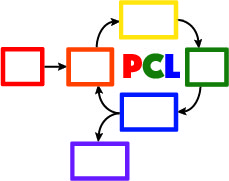I have been meaning to write the inaugural blog post for POGIL-PCL for a while now. I planned the first topic to be on the benefits of working with a community to write good POGIL experiments and activities. But I’d been struggling with a start until I attended the MAALACT meeting (http://www.maalact.org) this weekend. During a workshop someone asked me why it was so difficult to write POGIL experiments and have students get the key concepts you want them to get out it. The answer is that it is a difficult task to translate our learning goals for students into a series of questions that will directly lead them those goals. It’s even more so when one is doing an experiment rather than a classroom activity. Invariable, as one writes an activity, the nuances of the learn goals also change as we think more deeply on the subject.
The fact is that no one I know in the POGIL community writes a great activity on their own, right from the start. Some people are really good at it. Many of us have good ideas for a sequence of questions, a particular model, even an experiment cycle. But what we the faculty think is obvious, is often not so for our students and sometimes not even for other faculty colleagues. So, the activity needs to be revised and refined to make sure the students are well-guided, yet challenged to think at the same time. Oh, and there are some process goals you might want to address as well.
To develop a line of questioning for either a classroom or laboratory activity requires testing. You need to see what the students are going to do with any new activity. Then, you need revise the materials based on how the students respond. And then you need to do it again (and again and again). Then you need to give the activity along with a handbook containing process and content goals and some guiding stretegies to a colleague, preferably at a different institution. Have them try it out in their setting to see if they can facilitate your activity and get students to the goal(s) that you set out at the beginning.
Spoiler alert: It rarely goes exactly as planned.
Then you need to get feedback on how the experiment ran. What could students do? What did they struggle with? And what directions in the Instructor Handbook either confused your colleague or were missing? And you revise again.
Oh boy, is this a long process.
And that’s why the POGIL-PCL community is such a blessing. Among the many people on our mailing list are faculty who are really interested in trying new and interesting experiments in physical chemistry. And also willing to provide feedback to improve an experiment.
If you have an experiment your working on, feel free to share. Communicate with us on the team, particularly through this website (Want to get connected?) or email me directly and I will try to find others willing to try or at least review your experiment.
After all, it takes a village to write a good POGIL experiment.
